The Democratic Senatorial Campaign Committee (DSCC) is the Democratic Hill committee for the United States Senate. It is the only organization solely dedicated to electing Democrats to the United States Senate. The DSCC's current Chair is Senator Gary Peters of Michigan, who succeeded Nevada's Catherine Cortez Masto after the 2020 Senate elections. DSCC's current executive director is Christie Roberts.

The 2008 United States Senate elections were held on November 4, 2008, with 35 of the 100 seats in the Senate being contested. Thirty-three seats were up for regular elections; the winners were eligible to serve six-year terms from January 3, 2009, to January 3, 2015, as members of Class 2. There were also two special elections, the winners of those seats would finish the terms that ended on January 3, 2013. The presidential election, which was won by Democrat Barack Obama, elections for all House of Representatives seats; elections for several gubernatorial elections; and many state and local elections occurred on the same date.
An independent, non-partisan politician or non-affiliated politician is a politician not affiliated with any political party or bureaucratic association. There are numerous reasons why someone may stand for office as an independent.

The Victorian Greens, officially known as the Australian Greens Victoria, is the Victorian state member party of the Australian Greens, a green political party in Australia.
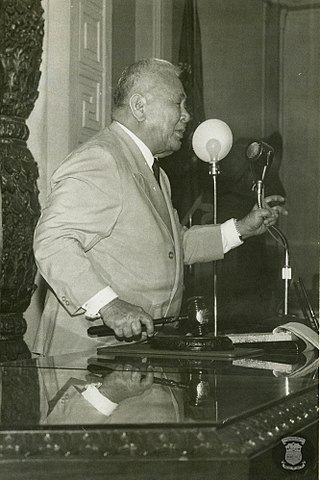
Elections for the members of the Senate were held on November 10, 1953 in the Philippines. Incumbent President Elpidio Quirino of the Liberal Party lost his opportunity to get a second full term as President of the Philippines to former Defense Secretary Ramon Magsaysay of the Nacionalista Party. Quirino's running mate, Senator Jose Yulo lost to Senator Carlos P. Garcia. Vice President Fernando Lopez did not run for re-election and ran for the Senate instead, in which he emerged as the candidate with the most votes. This was the first time that an elected president did not come from the Senate. To further compound the Liberal Party's woes, they also failed to win any seats in the Senate in this election.
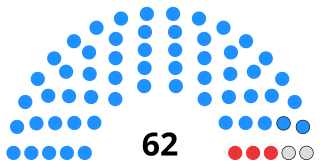
The Senate is the upper house of the Parliament of Cambodia. It is a legislative body composed of 62 members. 58 of the Senate seats are elected every six years by the commune councillors from 24 provinces of Cambodia and members of the National Assembly. In addition, the King nominates two senators, and the National Assembly nominates two, ending with a total of 62 senators. The Senate performs its duties as determined in the constitution and law in force. The Senate is chaired and presided by the president, currently Hun Sen of the Cambodian People's Party and assisted by two Vice Presidents.
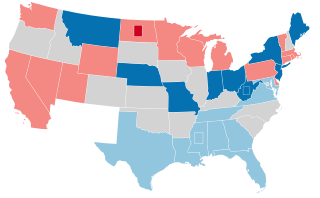
The 1910–11 United States Senate election were held on various dates in various states. As these U.S. Senate elections were prior to the ratification of the Seventeenth Amendment in 1913, senators were primarily chosen by state legislatures. Senators were elected over a wide range of time throughout 1910 and 1911, and a seat may have been filled months late or remained vacant due to legislative deadlock. However, some states had already begun direct elections during this time. Oregon pioneered direct election and experimented with different measures over several years until it succeeded in 1907. Soon after, Nebraska followed suit and laid the foundation for other states to adopt measures reflecting the people's will. By 1912, as many as 29 states elected senators either as nominees of their party's primary or in conjunction with a general election.

The 2008 United States elections were held on Tuesday, November 4, 2008, during the war on terror and the onset of the Great Recession. It was considered a Democratic wave election, with Democratic Senator Barack Obama of Illinois defeating Senator John McCain of Arizona by a wide margin, and the Democrats bolstering their majorities in both chambers of Congress, thereby marking the first time since 1992 in which the Democrats won Congress and the presidency in one election.

The 1850–51 United States Senate elections were held on various dates in various states. As these U.S. Senate elections were prior to the ratification of the Seventeenth Amendment in 1913, senators were chosen by state legislatures. Senators were elected over a wide range of time throughout 1850 and 1851, and a seat may have been filled months late or remained vacant due to legislative deadlock. In these elections, terms were up for the senators in Class 1.

The 1848–49 United States Senate elections were held on various dates in various states. As these U.S. Senate elections were prior to the ratification of the Seventeenth Amendment in 1913, senators were chosen by state legislatures. Senators were elected over a wide range of time throughout 1848 and 1849, and a seat may have been filled months late or remained vacant due to legislative deadlock. In these elections, terms were up for the senators in Class 3.

The 1856–57 United States Senate elections were held on various dates in various states. As these U.S. Senate elections were prior to the ratification of the Seventeenth Amendment in 1913, senators were chosen by state legislatures. Senators were elected over a wide range of time throughout 1856 and 1857, and a seat may have been filled months late or remained vacant due to legislative deadlock. In these elections, terms were up for the senators in Class 1.

The 1868–69 United States Senate elections were held on various dates in various states. As these U.S. Senate elections were prior to the ratification of the Seventeenth Amendment in 1913, senators were chosen by state legislatures. Senators were elected over a wide range of time throughout 1868 and 1869, and a seat may have been filled months late or remained vacant due to legislative deadlock. In these elections, terms were up for the senators in Class 1.

The 1900–01 United States Senate elections were held on various dates in various states, coinciding with President William McKinley's re-election as well as the 1900 House of Representatives elections. As these U.S. Senate elections were prior to the ratification of the Seventeenth Amendment in 1913, senators were chosen by state legislatures. Senators were elected over a wide range of time throughout 1900 and 1901, and a seat may have been filled months late or remained vacant due to legislative deadlock. In these elections, terms were up for the senators in Class 2.
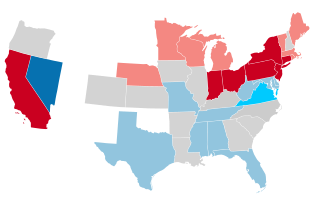
The 1880–81 United States Senate elections were held on various dates in various states, coinciding with the presidential election of 1880. As these U.S. Senate elections were prior to the ratification of the Seventeenth Amendment in 1913, senators were chosen by state legislatures. Senators were elected over a wide range of time throughout 1880 and 1881, and a seat may have been filled months late or remained vacant due to legislative deadlock. In these elections, terms were up for the senators in Class 1.
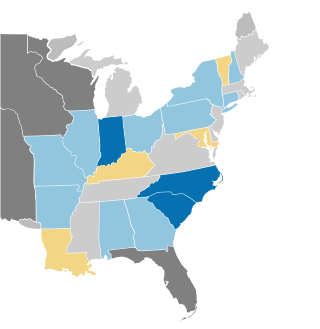
The 1842–43 United States Senate elections were held on various dates in various states. As these U.S. Senate elections were prior to the ratification of the Seventeenth Amendment in 1913, senators were chosen by state legislatures. Senators were elected over a wide range of time throughout 1842 and 1843, and a seat may have been filled months late or remained vacant due to legislative deadlock. In these elections, terms were up for the senators in Class 3.

The 1834–35 United States Senate elections were held on various dates in various states. As these U.S. Senate elections were prior to the ratification of the Seventeenth Amendment in 1913, senators were chosen by state legislatures. Senators were elected over a wide range of time throughout 1834 and 1835, and a seat may have been filled months late or remained vacant due to legislative deadlock. In these elections, terms were up for the senators in Class 2.
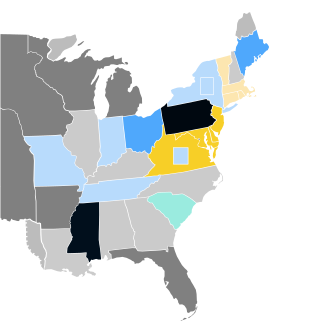
The 1832–33 United States Senate elections were held on various dates in various states. As these U.S. Senate elections were prior to the ratification of the Seventeenth Amendment in 1913, senators were chosen by state legislatures. Senators were elected over a wide range of time throughout 1832 and 1833, and a seat may have been filled months late or remained vacant due to legislative deadlock. In these elections, terms were up for the senators in Class 1.

The 1826–27 United States Senate elections were held on various dates in various states. As these U.S. Senate elections were prior to the ratification of the Seventeenth Amendment in 1913, senators were chosen by state legislatures. Senators were elected over a wide range of time throughout 1826 and 1827, and a seat may have been filled months late or remained vacant due to legislative deadlock. In these elections, terms were up for the senators in Class 1.

The 1864–65 United States Senate elections were held on various dates in various states. They occurred during the American Civil War and Abraham Lincoln's re-election. As these U.S. Senate elections were prior to the ratification of the Seventeenth Amendment in 1913, senators were chosen by state legislatures. Senators were elected over a wide range of time throughout 1864 and 1865, and a seat may have been filled months late or remained vacant due to legislative deadlock. In these elections, terms were up for the senators in Class 2.

The 1860–61 United States Senate elections were held on various dates in various states. As these U.S. Senate elections were prior to the ratification of the Seventeenth Amendment in 1913, senators were chosen by state legislatures. Senators were elected over a wide range of time throughout 1860 and 1861, and a seat may have been filled months late or remained vacant due to legislative deadlock. In these elections, terms were up for the senators in Class 3.




















